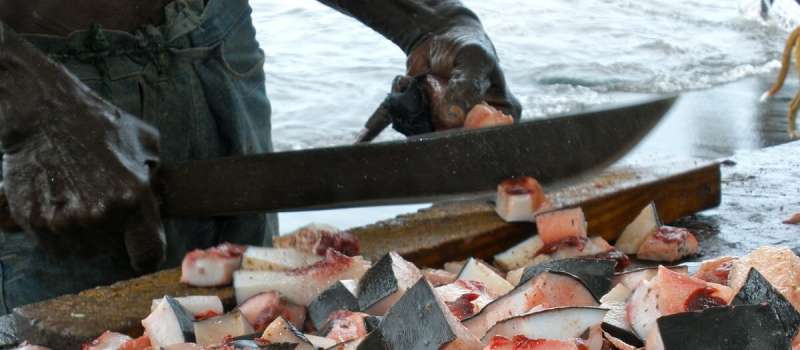Whale consumption should be dramatically decreased to avoid mercury poisoning

Researchers studying the level of mercury concentration of whales in the Caribbean were shocked to see dangerously high levels of the toxic substance in whale products sold for human consumption.
Whale is part of the diet for many in St. Vincent and the Grenadines—one of only four places in the world where artisanal subsistence whaling is still allowed. Despite the popularity of whale meat in a nation where 48 percent of residents are categorized as poor or vulnerable to poverty, researchers say the government should launch intervention campaigns establishing dietary recommendations to limit whale meat consumption.
"Whale products can contain high mercury levels, and consuming whale meat can cause health issues if consumed too often and in high quantities," said FIU Institute of Environment marine sciences assistant professor Jeremy Kiszka, a co-author of the study conducted in partnership with local and international collaborators, including whalers' representatives.
Because they are at the top of the food chain, some species of whales carry so much mercury from all the prey they eat. Killer whales, known to eat sperm whales twice their size in the Caribbean, carry the highest levels of mercury.
Eating a diet high in mercury can cause severe digestive and respiratory issues for people. Children born to mothers who consumed a high level of mercury may have developmental disabilities and cerebral palsy, according to the U.S. Centers for Disease Control and Prevention.
In St. Vincent and the Grenadines, whales are processed as soon as whalers arrive on shore. Meat is sold in bundles weighing about one-third of a pound and is consumed fresh, dried and then rehydrated, or cooked and stored in its own oil. Blubber is fried in whale oil and sold as a chicharron style snack called "crisps." And oil is sold as a cold remedy.
However, given the high mercury content, researchers say a typical adult weighing about 132 pounds should eat less 5 ounces of whale product in a week.
Researchers also discovered that while men were more than twice as likely to consume whale products than women, it is the women who are the primary planners of household meals. Intervention campaigns targeting women, likely would have a good chance of protecting the population from many of the effects of mercury toxicity, researchers said.
The study was recently published in the journal Human and Ecological Risk Assessment.
More information: Russell Fielding et al, Demographic and geographic patterns of cetacean-based food product consumption and potential mercury exposure within a Caribbean whaling community, Human and Ecological Risk Assessment: An International Journal (2021). DOI: 10.1080/10807039.2020.1870865
Provided by Florida International University




















